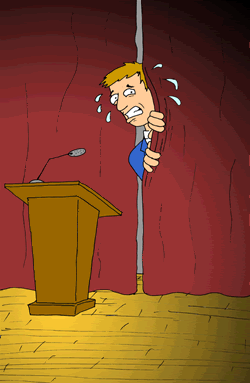
There are those who speak with an academic purpose. They
have information that needs to be conveyed.
There are those whose purpose in speaking is to get a result.
A process must be implemented; a change in behavior needs
to occur.
There are those who speak to present a revolutionary idea.
TED talks are famous for this.
And there are those whose purpose is to produce all three.
But without this single element, they’re not likely to succeed
at any of them: Inspiration.
What is inspiration? A dictionary definition is, “Stimulation
of the mind or emotions to a high level of feeling or activity.”
I would remove both uses of the word “or.” One is not
inspired if the emotions are not stimulated. So, to convey
information; to get a result; and to present a revolutionary
idea, the audience must feel. And there’s no point in
inspiring if there is no new activity.
So, as the leader of the room, it is essential that you feel.
How do you evoke emotion in yourself around your topic?
Ask yourself, What is the most influential, far-reaching
impact this topic can have?
If you are not getting there, you will not feel the emotion
that, in turn, inspires.
I was working with a successful, international speaker last
week on a new topic. We were circling around the one he
has been giving for years. But as I listened to him, I knew
it wasn’t engaging him as it should. I knew it wasn’t deep
enough. And I knew that was because it wasn’t addressing
the farthest-reaching impact this speaker could produce. I
asked him, “What final corral are you herding your audience
into?” (By no means did I mean that to be derogatory; it was
simply a visual device I knew would get at the answer that I
wanted.)
I wanted him to see that his current topic had a deeper end-
result than what he has been sharing. There is an ultimate
corral for them that he has not been moving them into. His
current topic was causing him lethargy because he was only
“herding” them into an intermediary corral; it was only going
so-far…but he didn’t realize that was a problem of any kind.
He didn’t know there was corral beyond! It took our session
for him to see that he wasn’t going far enough.
His topic has been on diversity. I asked him, “What is ultimately
possible if a corporate team accepts one another’s differences?”
He said, essentially, that they would be able to “do more as a
group.” I won’t say more about what we came to, as it is now
turning into a proprietary signature talk for him–but what he
saw was that he was stopping too short in the process and as
a result, was not speaking about a topic that was his truest
calling, his truest purpose. As a result, it was causing him to
be stopped short in his passion. He saw that he needed to design
a talk about the “final corral”: the potential of a group.
His voicemail the next day made me laugh: “Guru, Lizabeth!
Master, Expert, Brain-Sticky, Inspired Leader, awesome
Lizabeth! This is one of your most devoted fans. Thank you for
drilling down to what I am SOO passionate about, that I didn’t
even realize was there!”
In order to “stimulate the mind and emotions to a high level
of feeling and activity”—you must do the same for yourself
first. And that will come only when you are speaking about
the “final corral.” It may be very true that you, like my client,
are stopping too short, and short-changing your audience and
the results you could get.
As an Inspired Leader, it’s time to come into your own, and
drill down to your core-most purpose for being on a stage.
Ask yourself, What is the most influential, far-reaching
impact this topic can have?
Be sure to join me on my free 90-minute telecourse next
Monday: Secrets of Impact and Influence: The New Paradigm
of Public Speaking. It’s not your typical free teleclass!
www.bit.ly-sii-teleclass





